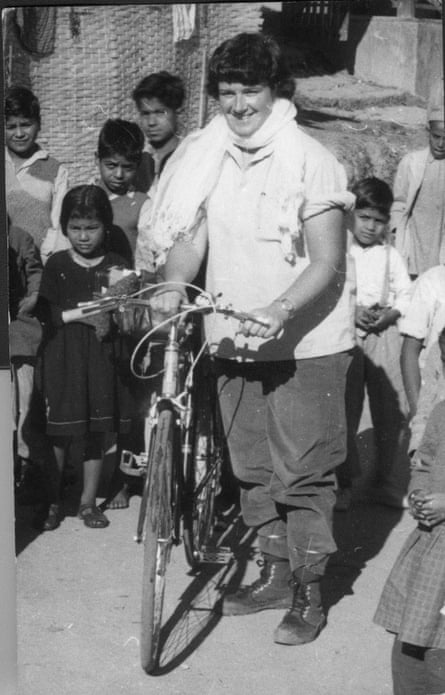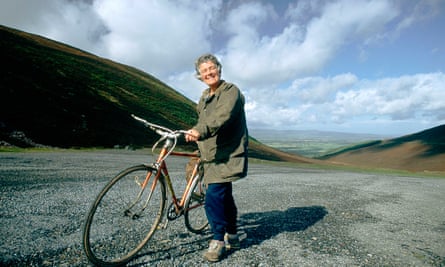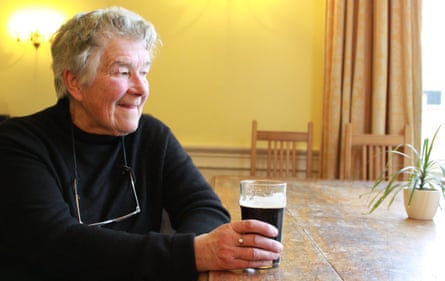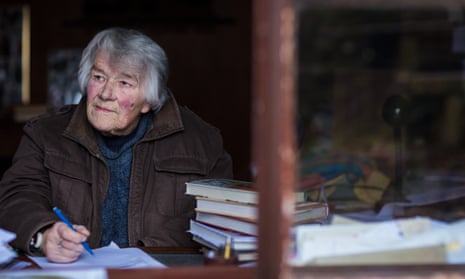The last time I saw Dervla was a few years ago, before lockdown, when she invited me for lunch at her home in Lismore, County Waterford. The meal was an agreeably liquid affair. One of Dervla’s great passions was beer. If Thesiger could cross the Empty Quarter just for a glass of water, Dervla was happy to cross Rwanda just for the pleasure of a glass of African stout.
Bottle in hand and holding court on a sofa with that familiar, determined gleam in her eye, she complained vigorously about how difficult it was to visit friends or travel with her now increasing age – although I did point out how much of her 80s had been spent roughing it in difficult areas of Palestine, which produced a final – and fine – pair of books.
I was struck by the sheer extent of her library, which spread from room to room. Most travel writers end up with a shelf or two on their specialist areas, be it South America or India. But over 20 books in a globetrotting career of more than half a century, Dervla had covered the world.
Yet she had a relatively late start as a writer. Born to a staunchly republican family in Lismore, she cared for her ageing parents until she was 30. Desperate to travel abroad, “like an elastic stretched to breaking point”, she catapulted off to India on a bicycle when she was finally able to leave Ireland in 1963. Before going, she practised firing an automatic pistol in the County Waterford hills; then she stripped the gears off her trusty bike, Rocinante, so there was less to go wrong – although it can’t have made the Afghan passes any easier.

But then – as she once admonished me when I complained about some journey – her mantra was you should “never want your travelling to be easy, Hugh”. Even by her own arduous standards, that first journey was quite extraordinary. With just a change of underwear and her pistol, she set off to Istanbul and beyond. The mountain passes were frozen. In Bulgaria she was attacked by wolves and had to shoot them. The gun came in handy again later for a warning shot when a Kurd tried to assault her.
Letters detailing her adventures were posted back to Irish friends in instalments, but she never expected her words to be published. When she reached Delhi, she was spotted cycling in the street by Penelope Betjeman, who was intrigued by this Irishwoman who had just travelled overland solo for thousands of miles. “Penelope invited me back to her hotel room to eat tinned peaches straight out of the can, as she had no plates.”
The poet’s wife introduced her to British publishing firm John Murray, and the result was her first book, Full Tilt: Ireland to India with a Bicycle. It was the start of a professional relationship that lasted for decades. Murray’s published many more books about her travels to Africa, Laos and just about every point of the compass.
She once told me it was the duty of the writer to enter into the lives of those they portray: “to sleep on their floors”, as she put it. She felt her upbringing in rural Ireland helped her to accept considerable deprivations when abroad. The entire six-month journey to India cost just £64 7s 10d.

On that first journey through Afghanistan on her bike, Dervla was appalled to meet foreigners who never talked to an Afghan, let alone entered their homes: “All they had done was photograph them.” In Full Tilt, she describes meeting a 25-year-old American boy, typical of those she met on the trip: “For them, travel is more a going away from rather than going towards, and they seem empty and unhappy and bewildered and pathetically anxious for companionship, yet are afraid to commit themselves to any ideal or cause or other individual.”
As a single mother after her daughter Rachel was born in 1968 – no easy matter in 1960s Ireland – she defied convention by insisting on taking the girl wherever she went. “People would say to me, ‘what do you think you’re doing, taking a defenceless girl to the wilds of the Andes?’”
The visit to Peru with Rachel – related in Eight Feet in the Andes: Travels with a Mule in Unknown Peru (1983) – was, in her words, a turning point. Until then, she’d enjoyed the sheer liberation and excitement of travel, but the miseries endured by Indigenous people brought home to her how tough conditions were in places like the slums of Lima, with its rampant cholera and tuberculosis.
In later years she was strongly drawn to countries that were at odds with the rest of the world: to Russia, where she rode the Siberian railways at 70 (she had originally planned to bicycle, but damaged her ankle in a fall); to Cuba with not only her daughter but three granddaughters; and in her final books about Palestine for Eland Books, which picked up the baton when she left Murray’s in 2008 (“I got too political”) and was superbly supportive.

As I reread the books, after the sadness of her death, the best still seem, like her first, letters home. What comes across most strongly is her consistent honesty: she was the most reliable of narrators and a master of straight reportage. She also had that rare ability to get under the skin of a country, and to listen well. In Russia, she gained confidences as a grandmotherly babushka that others might not have – “so there are at least a few advantages to getting old!”, she assured me.
Unusually among travel writers, she never accepted a commission for a book before making a journey, preferring to wait to see if she found anything interesting to say – an example that others could usefully follow.
She certainly liked reporting inconvenient truths. She argued that women enjoyed far greater freedom under the Soviets in Afghanistan or under Saddam in Iraq than they did at other times in those countries.
Despite the many tributes that have poured out in recent days, it’s important to remember that in her lifetime Dervla was often seen as anti-establishment and given a rough ride. Her book on Northern Ireland in the 1970s, A Place Apart, was necessarily polemic and far from the sugar-coated version shown in Kenneth Branagh’s recent Belfast. When, some years ago, I tried to persuade the BBC to do a lifetime legacy film about Dervla’s achievements, I met with resistance and, to my sadness, they never made it. She revelled in a certain anti-authoritarian and mischievous attitude, and her books reflect that.
I once asked Dervla if she felt elegiac for the planet. “Well let’s face it, it’s hard to feel optimistic.” And she raised a glass.
In return, I raise a glass back to her: to a wonderfully iconoclastic and bold traveller, and loyal friend, who wrote it as she saw it and maintained her adventurous spirit to the very end. Perhaps a glass of home-fermented Ethiopian talla, poured from a cool earthenware jar.

Comments (…)
Sign in or create your Guardian account to join the discussion